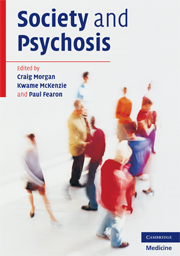Book contents
- Frontmatter
- Contents
- Contributors
- Acknowledgements
- 1 Introduction
- 2 Climate change in psychiatry: periodic fluctuations or terminal trend?
- Part I Theoretical and conceptual foundations
- Part II Social factors and the onset of psychosis
- Part III Social factors and the outcome of psychosis
- Part IV Models and conclusions
- Index
- References
2 - Climate change in psychiatry: periodic fluctuations or terminal trend?
Published online by Cambridge University Press: 07 December 2009
- Frontmatter
- Contents
- Contributors
- Acknowledgements
- 1 Introduction
- 2 Climate change in psychiatry: periodic fluctuations or terminal trend?
- Part I Theoretical and conceptual foundations
- Part II Social factors and the onset of psychosis
- Part III Social factors and the outcome of psychosis
- Part IV Models and conclusions
- Index
- References
Summary
Introduction
The direction of research and practice in all fields of medicine is determined by a multiplicity of pressures, including government policy, public demands, economic factors, technical advances and the intellectual zeitgeist. All of these operate in psychiatry, but in addition the social and psychological elements of psychiatric conditions are so prominent that they apply extra pressure. With a few exceptions, such as Alzheimer's disease and Huntington's chorea, the underlying pathology of psychiatric illnesses remains unknown or at best controversial. This situation nurtures the flourishing of many theories and opinions in the domains of biology, psychology and sociology. Opposing camps have grown up with adherents from psychology and sociology in one camp (humanist) and proponents of biological explanations in the other (reductionist, according to the humanists). Over the past decades there have been regular pleas from integrationists to merge differences between the two camps and develop a holistic biopsychosocial approach (e.g., Engel, 1980). Major barriers to this resolution have been the absence of a unifying language to describe the integrated phenomena, and the scepticism of biologists about the ability of the humanists to adopt a ‘hard-nosed’ scientific approach to the testing of their theories (see Clare, 1980; Sedgwick, 1982).
As a result of the polarisation of these two camps, there has been a struggle for the ascendancy of one over the other that has continued throughout the last century (Sedgwick, 1982). The theoretical disputes have been closely paralleled by arguments over the clinical practice of psychiatry.
Keywords
- Type
- Chapter
- Information
- Society and Psychosis , pp. 11 - 22Publisher: Cambridge University PressPrint publication year: 2008
References
- 5
- Cited by

